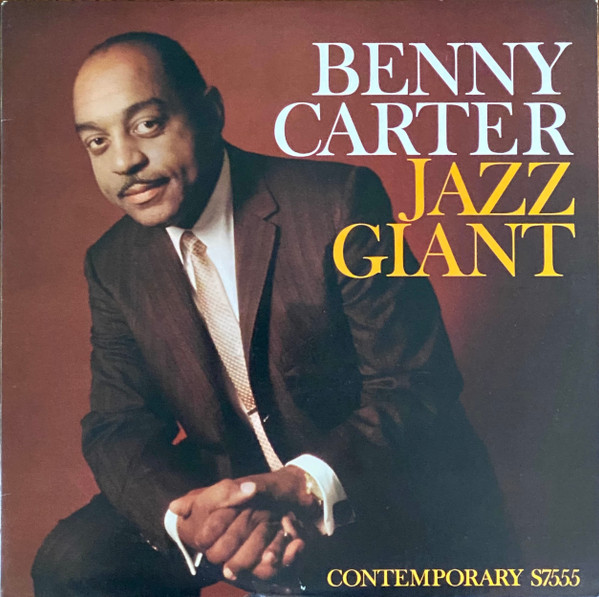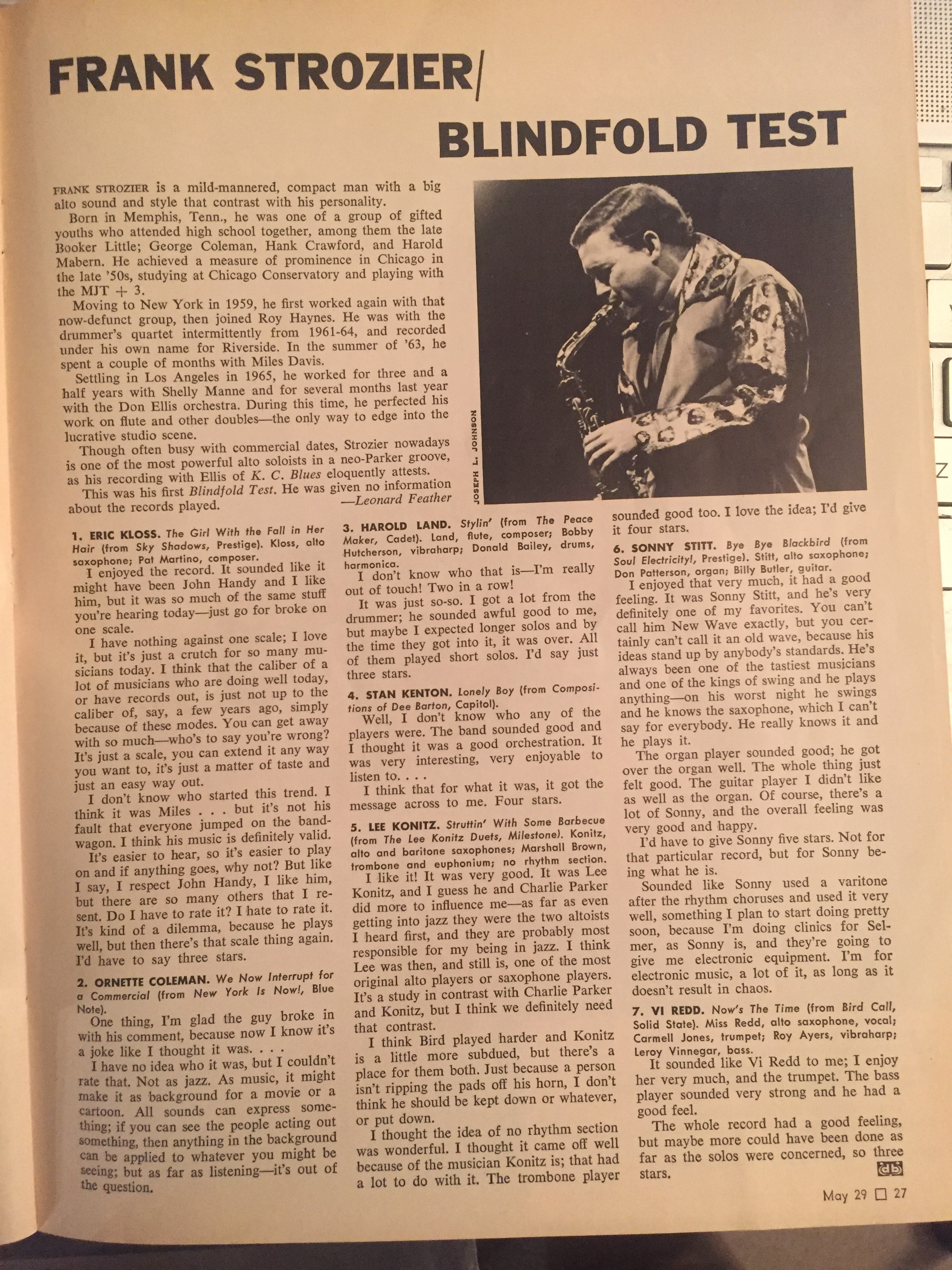Startseite › Foren › Über Bands, Solokünstler und Genres › Eine Frage des Stils › Blue Note – das Jazzforum › Bird Calls – Das Altsax im Jazz
-
AutorBeiträge
-

Please donate to the Arthur Blythe Parkinson’s fund
Update: Oct 14th 2013
To every person who has offered money, words and prayers for Arthur Blythe, he would like you to know… he could not sing loud enough to thank you for your help. Arthur has Parkinson’s disease and is currently in a rehabilitation center in Antelope valley.He will be released at the end of this month. The release is based on the medicare system cutting off funds which has been providing him with 24 hour healthcare. The next step is to out fit his home with a walk in tub to enable his therapy to continue. With the suggested $10 donation for this piece of music, we will use all of these funds towards his in home rehabilitation. Arthur’s condition Parkinson’s disease has no cure and is progressive.
Arthur is on medication which allows helps him to speak and swallow limited foods. He is still wheel chair bound , as his physical therapy continues the hope is he will be able to walk with-in the next 6 months. His spirit is strong and he does offer us all humor, in the only way Mr. Blythe can. The music His voice is so strong here and this is a pure improvisation by him.
With respect and sincerity,
Gust Tsilis____________________
On June the 3rd, 2013, Arthur went into the USC Keck Center to have a large benign tumor removed from his right Kidney. The operation was serious, as Arthur spent one week after the procedure in an induced coma in their ICU unit. His health has been a challenge for him for several years now. The Parkinson’s (Arthur has been living with Parkinson’s for 8 years) has developed more rapidly and at this time he is in a rehabilitation center in Lancaster, CA. His goal is to be back home (?) within the next 30 days. The recent operation he underwent diminished his ability to walk and swallow foods. He is fighting hard each day to gain his strength back.
Please understand for Arthur to ask for help from his friends and fans, of his person and his music, was a difficult question he pondered over for some time. Arthur is a man of great pride and humility. His respect for people and their daily struggles has kept him from announcing his own dilemma for several years. Now he is facing an immediate need to procure a new neurologist to evaluate him after his recent surgery.
Arthur needs to remain in a secure place economically in order to fight Parkinson’s disease. Your donations will be a main source of his recovery. All the monies raised will be used to help him in his quest to regain his health and to stay current with his basic bills. Thank you in advance, with all sincerity and profound humility… from Arthur himself. Updates on his condition and the progress of this fund drive will be posted regularly. All of your good wishes and words will be read to Arthur.
____________________http://gusttsilis.com/arthurblythe/
--
"Don't play what the public want. You play what you want and let the public pick up on what you doin' -- even if it take them fifteen, twenty years." (Thelonious Monk) | Meine Sendungen auf Radio StoneFM: gypsy goes jazz, #168: Wadada & Friends - Neuheiten 2025 (Teil 2) - 9.12., 22:00 | Slow Drive to South Africa, #8: tba | No Problem Saloon, #30: tbaHighlights von Rolling-Stone.deSinéad O’Connor: Das symbolisierte ihr rasierter Kopf
Jim Morrison: Waidwunder Crooner und animalischer Eroberer
John Lennon: Sein Tod und die Geschichte seines Mörders
Silvester-Tipp von Phil Collins: Mit „In The Air Tonight“ ins neue Jahr
Die besten Musiker aller Zeiten: The Who – Essay von Eddie Vedder
Amazon Prime Video: Die wichtigsten Neuerscheinungen im Dezember
WerbungHerb Geller (1928-2013)
www.artsjournal.com/rifftides/2013/12/herb-geller-1928-2013.html
--
"Don't play what the public want. You play what you want and let the public pick up on what you doin' -- even if it take them fifteen, twenty years." (Thelonious Monk) | Meine Sendungen auf Radio StoneFM: gypsy goes jazz, #168: Wadada & Friends - Neuheiten 2025 (Teil 2) - 9.12., 22:00 | Slow Drive to South Africa, #8: tba | No Problem Saloon, #30: tba
Marc Myers‘ Interview mit Flory ist sehr unterhaltsam:
http://www.jazzwax.com/2009/07/interview-med-flory-part-1.html--
"Don't play what the public want. You play what you want and let the public pick up on what you doin' -- even if it take them fifteen, twenty years." (Thelonious Monk) | Meine Sendungen auf Radio StoneFM: gypsy goes jazz, #168: Wadada & Friends - Neuheiten 2025 (Teil 2) - 9.12., 22:00 | Slow Drive to South Africa, #8: tba | No Problem Saloon, #30: tbaEr spielte zwar nicht nur Altsax, aber ich bringe die Nachricht vom Tod Paul Horns (1930-2014) doch mal hier unter.
Nachruf der LA Times:
http://www.latimes.com/local/obituaries/la-me-paul-horn-20140705-story.html--
"Don't play what the public want. You play what you want and let the public pick up on what you doin' -- even if it take them fifteen, twenty years." (Thelonious Monk) | Meine Sendungen auf Radio StoneFM: gypsy goes jazz, #168: Wadada & Friends - Neuheiten 2025 (Teil 2) - 9.12., 22:00 | Slow Drive to South Africa, #8: tba | No Problem Saloon, #30: tbadamit das hier auch noch ordentlich Erwähnung findet:

Phil Woods (1931-2015)
Nachruf in der NY Times:
http://www.nytimes.com/2015/09/30/arts/music/phil-woods-saxophonist-revered-in-jazz-dies-at-83.html?_r=0Definitiv nicht mein Lieblingsmusiker, aber seine besten Aufnahmen sind klasse, daran gibt es nichts zu rütteln – nicht nur frühe wie die Alben mit Jon Eardley („Pot Pie“), Red Garland („Sugan“ – wie Art Pepper lieh auch Woods sich die Rhythmusgruppe des damaligen Miles Davis Quintet, dazu stiess Ray Copeland, damals der Lieblingstrompeter von Thelonious Monk und Randy Weston) oder „Woodlore“ (im Quartett mit John Williams) sondern auch spätere Alben aus Europa mit seiner Rhythm Machine, darunter „Alive and Well in Paris“ (1968) oder „Phil Woods and His European Rhythm Machine at the Montreux Jazz Festival“ (1969, beide mit George Gruntz, Henri Texier und Daniel Humair).
Es gibt natürlich noch mehr: ein Muse-Album mit Jaki Byard, ein gutes Candid-Album, ein spätes Treffen mit Johnny Griffin, die „Bird’s Night“-Aufnahmen für Savoy mit Cecil Payne, Duke Jordan und Frank Socolov … (und es gab tatsächlich Zeiten, in denen er nicht alt, dick und selbstgerecht war – und es gibt Platten, die all das vergessen machen!)
--
"Don't play what the public want. You play what you want and let the public pick up on what you doin' -- even if it take them fifteen, twenty years." (Thelonious Monk) | Meine Sendungen auf Radio StoneFM: gypsy goes jazz, #168: Wadada & Friends - Neuheiten 2025 (Teil 2) - 9.12., 22:00 | Slow Drive to South Africa, #8: tba | No Problem Saloon, #30: tbaPhil Woods spielte auch für Benny Goodman auf deren Russland Tournee 1961.
Ich mochte seinen vollen satten Sound, hab ihm auch nochmal in München gesehen, da war schon gesundheitlich schwer angegriffen.
--
Paul Desmond im Gespräch mit Charlie Parker, 1954
--
"Don't play what the public want. You play what you want and let the public pick up on what you doin' -- even if it take them fifteen, twenty years." (Thelonious Monk) | Meine Sendungen auf Radio StoneFM: gypsy goes jazz, #168: Wadada & Friends - Neuheiten 2025 (Teil 2) - 9.12., 22:00 | Slow Drive to South Africa, #8: tba | No Problem Saloon, #30: tbaIch hatte es vorhin schon erwähnt, jetzt auch mit Link auf einen Nachruf: Richie Cole ist gestorben
https://jazzbuffalo.org/2020/05/02/alto-sax-master-richie-cole-has-died-at-the-age-of-72/In der Tube findet man ziemlich viel, z.B. hier im Village Vanguard, wie ein „ed cherry“ (der Gitarrist? es gibt ja im Netz genügend Leute, die sich als Imposter noch der obskursten „Promis“ ausgeben, bin da etwas vorsichtig geworden) von ca. 1980/81:
Oder hier, 1979 mit Eddie Jefferson:
--
"Don't play what the public want. You play what you want and let the public pick up on what you doin' -- even if it take them fifteen, twenty years." (Thelonious Monk) | Meine Sendungen auf Radio StoneFM: gypsy goes jazz, #168: Wadada & Friends - Neuheiten 2025 (Teil 2) - 9.12., 22:00 | Slow Drive to South Africa, #8: tba | No Problem Saloon, #30: tbaPost von mir für mich

Howard Reich über Richie Cole (für den Chicago Tribune, 18. Mai):
If I had to crystallize alto saxophonist Richie Cole’s art in a single word, it would be “exuberance.” Or maybe “ebullience.” Or perhaps “exhilaration.”
For when Cole hit the stage, you knew you were about to be nearly overwhelmed by a tidal wave of rhythmic energy, emotional heat, technical brilliance and, oh yes, improvisational ingenuity. Other altoists may have been more subtly nuanced, discreetly understated, coolly reserved or high-toned in their delivery. But Cole put it all out there, everything he had, full blast, straight, no pretense. And audiences loved him for it.
…
“What happened was that I was working 40 weeks out of the year, which helped to contribute to my problems, because there’s a positive and a negative thing about traveling.
“You play the gig, and everybody loves you for two hours, then all of a sudden you have 22 hours of sitting around by yourself, staring at hotel room walls and hanging out in airports. It takes its toll.
“Also, every time you walk onstage, you’re supposed to be a genius. And sometimes all you want to do is sit home and watch ‘Geraldo.’ The last thing you want to do that night is play the saxophone.”
Having just about burned out, Cole had decided to “cool out here, in the Midwest, and get away from a lot of bad influences,” he told me.
And the plan worked.
His 1993 “comeback” album, “Profile” (Heads Up), showed him in superior form, “his improvisations more clever, his tone more ebullient, his lines more searing than ever,” as I wrote in my review. His follow-up, “Kush: The Music of Dizzy Gillespie” (Heads Up), attested to his reverence for bebop and his decidedly personal spin on it.
…
--
"Don't play what the public want. You play what you want and let the public pick up on what you doin' -- even if it take them fifteen, twenty years." (Thelonious Monk) | Meine Sendungen auf Radio StoneFM: gypsy goes jazz, #168: Wadada & Friends - Neuheiten 2025 (Teil 2) - 9.12., 22:00 | Slow Drive to South Africa, #8: tba | No Problem Saloon, #30: tba
soulpope "Ever Since The World Ended, I Don`t Get Out As Much"Registriert seit: 02.12.2013
Beiträge: 56,976
gypsy-tail-windPost von mir für mich :whiste: Howard Reich über Richie Cole (für den Chicago Tribune, 18. Mai):
If I had to crystallize alto saxophonist Richie Cole’s art in a single word, it would be “exuberance.” Or maybe “ebullience.” Or perhaps “exhilaration.” For when Cole hit the stage, you knew you were about to be nearly overwhelmed by a tidal wave of rhythmic energy, emotional heat, technical brilliance and, oh yes, improvisational ingenuity. Other altoists may have been more subtly nuanced, discreetly understated, coolly reserved or high-toned in their delivery. But Cole put it all out there, everything he had, full blast, straight, no pretense. And audiences loved him for it. … “What happened was that I was working 40 weeks out of the year, which helped to contribute to my problems, because there’s a positive and a negative thing about traveling. “You play the gig, and everybody loves you for two hours, then all of a sudden you have 22 hours of sitting around by yourself, staring at hotel room walls and hanging out in airports. It takes its toll. “Also, every time you walk onstage, you’re supposed to be a genius. And sometimes all you want to do is sit home and watch ‘Geraldo.’ The last thing you want to do that night is play the saxophone.” Having just about burned out, Cole had decided to “cool out here, in the Midwest, and get away from a lot of bad influences,” he told me. And the plan worked. His 1993 “comeback” album, “Profile” (Heads Up), showed him in superior form, “his improvisations more clever, his tone more ebullient, his lines more searing than ever,” as I wrote in my review. His follow-up, “Kush: The Music of Dizzy Gillespie” (Heads Up), attested to his reverence for bebop and his decidedly personal spin on it. …
Wurde auch zu einer Post für mich …. thnx ….
--
"Kunst ist schön, macht aber viel Arbeit" (K. Valentin)Frank Strozier disst Ornette, Down Beat vom 29. Mai 1969 (via Mark Strykers Twitter-Feed – er hat noch mehr aus dem Heft eingestellt: Sonny Rollins, Dexter Gordon, Reviews von „Now He Sings, Now He Sobs“, „Filles De Kilimanjaro“ und „Tetragon“):
--
"Don't play what the public want. You play what you want and let the public pick up on what you doin' -- even if it take them fifteen, twenty years." (Thelonious Monk) | Meine Sendungen auf Radio StoneFM: gypsy goes jazz, #168: Wadada & Friends - Neuheiten 2025 (Teil 2) - 9.12., 22:00 | Slow Drive to South Africa, #8: tba | No Problem Saloon, #30: tbaMorgen abend im Radio:
Sonntag, 19. Juni 2022
19.17 – 20.00 Uhr
SWR 2Keeper of the Flame – Die swingenden Botschaften des Altsaxophonisten Phil Woods
Von Odilo ClausnitzerDer SWR schreibt dazu in seiner Sendungsankündigung:
„Seine Altsaxophonstimme war eine der mitreißendsten und swingendsten des modernen Jazz. Und unter allen, die sich auf das Vorbild Charlie Parkers bezogen, war sie auch eine der persönlichsten: Nur ein paar Mal bewußt vernommen, war sie sofort wieder zu erkennen. Phil Woods gehörte zu den großen Geschichtenerzählern unter den Jazzimprovisatoren. Die Stationen seiner Karriere waren Meilensteine: die Dizzy Gillespie Big Band, das Quincy Jones Orchestra, seine eigene „European Rhythm Machine“ und später seine amerikanische Combo – ein unerschöpfliches Jazz-Kraftwerk.“
--
"Bird is not dead; he's hiding out somewhere, and will be back with some new shit that'll scare everybody to death." (Charles Mingus)Da Altsaxofon die größte Konstante bei ihm blieb, poste ich es mal aus Verlegenheit hier:
Ernst-Ludwig Petrowsky ist mit 89 Jahren gestorben.
--
A Kiss in the DreamhouseOh, das ist traurig. Das Zentralquartett mochte ich immer sehr gerne.
--
"Don't play what the public want. You play what you want and let the public pick up on what you doin' -- even if it take them fifteen, twenty years." (Thelonious Monk) | Meine Sendungen auf Radio StoneFM: gypsy goes jazz, #168: Wadada & Friends - Neuheiten 2025 (Teil 2) - 9.12., 22:00 | Slow Drive to South Africa, #8: tba | No Problem Saloon, #30: tbaApropos Altsaxofon. Ein weiterer schöner Schallplattenfund.

Benny Carter – Jazz Giant (1958)
Eine der schönen Begleiterscheinungen beim Jazzhören sind die Wegegabelungen, auf die man trifft, wo man mal in die eine oder andere Richtung abbiegen kann. Bei einer meiner letzten Vinyl-Erwerbungen sprang mir zunächst nur der Name Coleman Hawkins auf dem Cover ins Auge. Das erregte mein Interesse an einer Benny Carter-LP. Ich sah, wagte und gewann indem ich zugriff. Zuvor hatte ich von Benny Carter noch nie und nichts gehört. Further Definitions ist tatsächlich eine ganz wunderbare Platte, die ich weiter oben schon kurz erwähnte, die aber eigentlich noch mehr Aufmerksamkeit verdient.
Zunächst aber Jazz Giant. Der Titel ist vielleicht etwas zu groß und zu programmatisch – auch wenn dieser Titel für Benny Carter wohl nicht ganz verkehrt ist. Benny Carter ist nicht nur ein toller Altsaxofonist, er spielt hier auch Trompete. Vor allem ist er aber ein toller Arrangeur und Komponist – hier mit zwei Eigenkompositionen und 5 Fremdkompostionen, die ich aber wohl noch nie irgendwo anders gehört habe. Mit Alt, Tenor und Posaune eine kleine Horn Section, dazu Piano, Gitarre, Bass und Drums. Ben Webster am Tenor erkenne ich gefühlt schon am Einatmen. Über einen der beiden Pianisten, Andre Previn, lese ich, dass er ursprünglich Andreas Ludwig Priwin hieß und 1938 aus Deutschland über Frankreich in die USA fliehen musste.
Volle und samtige Bläsersätze, lang gezogene melodische Passagen, schöner federnder Swing, mit Carter und Webster zwei individualistische Solisten, wobei aber auch die anderen gut zu Wort kommen.
Hätte man die Platte nach der Carter Komposition A Walking Thing benannt, hätte man damit die Latte nicht ganz so hoch gehängt und die Musik wäre nicht weniger großartig gewesen.
Ben Websters Solo ab ca. 1:25, Barney Kessel an der Gitarre ab 2:00, Frank Rosolino, Posaune ab 2:25 und Benny Carter selbst ab 3:45.
zuletzt geändert von gypsy-tail-wind--
“There are legends of people born with the gift of making music so true it can pierce the veil between life and death. Conjuring spirits from the past and the future. This gift can bring healing—but it can also attract demons.” (From the movie Sinners by Ryan Coogler) -
Du musst angemeldet sein, um auf dieses Thema antworten zu können.
